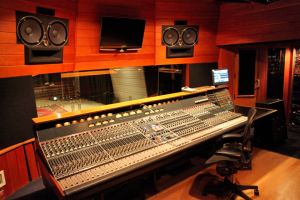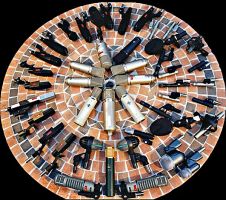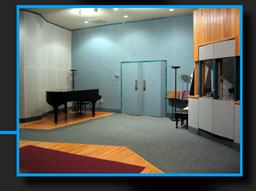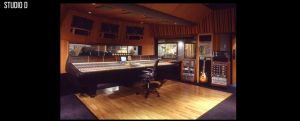My local studio, the Music Annex, finally closed its doors a few months ago. I owe the Annex a debt because it was there that I learned about recording and music production.
The people that owned it weren't stupid. In fact they were good business people that watched their numbers. They diversified through the years so that they could keep their music recording business alive. In the 80s when cassettes were the way people listened to music they added a major tape duplication operation, which morphed into CD duplication (Remember when CD duplicators were prohibitively expensive). In the 90s, when home studios were booming and taking away their music production business they opened a post-production studio in San Francisco and started a service to provide audio for toys and games.
In the late 90s during the initial growth of the commercial web they made the assumption that a big part of the advertising industry would find its way to the Bay Area because of their proximity to the heavily financed ".coms." To take advantage of the perceived trend they invested heavily in building a video editing facility alongside their existing audio infrastructure. It proved to be a disastrous decision when the .com bubble burst and the advertising business didn't materialize. They were left with a tremendous debt that the business never really recovered from.
Project studios first appeared when successful producers and recording artists started building studios in their houses so that they could record any time they felt like it and avoid (or at least isolate) the distractions of stardom. It was an extremely expensive proposition until the price came down dramatically in the 90s with the widespread adoption of comparatively inexpensive DAW software and hardware. As a result commercial studios like the Music Annex are disappearing.
During the 133rd AES Convention I thought it would be interesting to look at the reasons why we all need them:
- Commercial studios invest in leading edge technologies. They are required to do this to satisfy demanding clients and compete with other studios at the professional level. This allows clever companies in the Pro Audio industry to continue to develop technologies that the rest of the industry eventually benefits from.
- Commercial studios often have large collections of vintage gear. The best studios have microphone collections that project studios can only dream about. Many vintage guitars, pianos, and synthesizers have found their way into commercial studios where they are alive, well maintained, and well recorded when the time comes.
- Commercial studios have their own techs. This is huge! Please raise your hand if you spend as much as 20% of your music time trying to figure out what's broken. The lead tech at the Annex was Roger Weirsima who could fix anything (analog gear, cars, plumbing, washing machines, etc.). I long ago lost track of the number of times I have called him over the years with a technical question or a problem that required his refined soldering skills.
- Each project that is done in a commercial studio makes it better. This is true of a project studio as well, but when there are many engineers working on many projects, each project contributes to the knowledge base of the engineers and support people that frequent the studio. Generally there is only one or two people in a project studio, so the experience will be more limited.
- Commercial Studios provide live rooms and the best true sound isolation. Their recording engineers know how to place musicians within their rooms both for optimal acoustics (bleed, etc.) and of equal importance for music interaction. Although there is lots of high quality modeling plug-ins in the market there is still no substitute for the real thing when music is being played live. As Russell Bond from the Music Annex says: "Today, it's the 'live room' that is the most valuable asset a commercial studio can boast because of the versatility and controllability. A well designed room is transparent to the recording process and it's dedicated purpose is intended to be a comfortable environment to be creative in".
- Big studios (like Skywalker in San Rafael, CA) can accommodate a big band or symphony orchestra for film and TV dates. Got that big band arrangement or string quartet you have written and are just dying to hear it rendered by humans. Yes, you can render these pieces using one of many great sample library packages, but everyone that has experienced their music played by a real orchestra will tell you that it isn't even close.
- Certain commercial studios have a well-regarded (in some cases legendary) 'room sound' with is a characteristic of its own. Often people will book session in specific places such as Avatar in NY or Motown in LA for a certain perceived "vibe".
- Nothing beats a commercial studio for film sync with lots of input channels and output buses (for stems), lots of people in the control room and large projection screens.
- Commercial studios usually offer mastering engineers and mastering rooms. Although there are some great mastering plug-ins on the market having a new set of ears at the final stage can be very helpful.
- Commercial studios have a built in network. Nothing is ever assured when trying to place any creative work, but working in commercial studios can increase the odds of making the right contact. Most studio owners keep a Rolodex of musicians, songwriters, arrangers, etc. Where else could you hope to find a community of people to:
- Write and arrange music with.
- Listen to and critique your music.
- Introduce you to others with similar interests.
- Potentially place you or your music in their own network.
I did a little research at The Village in Los Angeles and I can say that this community idea is alive and well there. The operation is run by Jeff Greenberg, who creates a comfortable and fun atmosphere for his clients to work within.
The building is like a labyrinth and easy to get lost inside. They make ends by doing mostly music and film recording, but the studio is also home base for successful producers and recording engineers like T-Bone Burnett, and John Alagia as well as songwriters like John Mayer and Mary Louis Goffin. Greenberg fosters a very collegial environment both socially and educationally.
It's an operation worth checking out and if you are in LA you should.








 Other Related News
Other Related News


